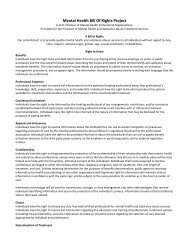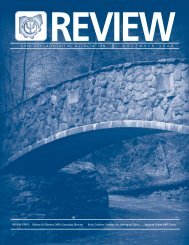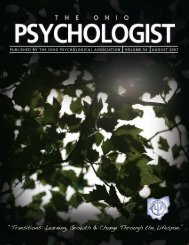The OP Review November 2005 - Ohio Psychological Association
The OP Review November 2005 - Ohio Psychological Association
The OP Review November 2005 - Ohio Psychological Association
You also want an ePaper? Increase the reach of your titles
YUMPU automatically turns print PDFs into web optimized ePapers that Google loves.
<strong>Ohio</strong> Psychologists Respond to Hurricanes<br />
By Kurt Jensen, PsyD, Disaster Response Network Coordinator<br />
I<br />
n recent weeks, hundreds of <strong>Ohio</strong> psychologists and<br />
mental health professionals have responded in the<br />
aftermath of Hurricanes Katrina and Rita. Included in<br />
this group were dozens of <strong>OP</strong>A psychologists who provided<br />
consultation, assessment and counseling services–both locally<br />
and nationally–to assist victims of these disasters. Many of<br />
these volunteers were mobilized through <strong>OP</strong>A’s Chapter of<br />
APA’s Disaster Response Network (DRN), working with the<br />
American Red Cross to provide support to those hardest hit by<br />
the hurricanes.<br />
Dr. Michael Dwyer, a professor at Baldwin-Wallace College<br />
(B-W) in Berea, was one <strong>OP</strong>A member who responded in a<br />
prompt and focused manner following Hurricane Katrina’s strike<br />
in New Orleans. Dr. Dwyer helped organize a planning<br />
committee at B-W, comprised of a team of students, teachers<br />
and staff charged with developing a strategic, multi-level<br />
response. He coordinated the development of a Web site that<br />
served as the information and coordination center for B-W’s<br />
relief activities. <strong>The</strong> college has sent teams of 20 students to<br />
the disaster site, raised thousands of dollars through student<br />
and private donors and “adopted” a small town of 1,200<br />
outside of Gulfport, Mississippi.<br />
At least three previous <strong>OP</strong>A presidents–Drs. James Brush,<br />
Ken Drude and Donald Freedheim–also worked at the local<br />
level to assist Hurricane survivors. Dr. Brush worked for two<br />
days in Cincinnati where they took in hundreds of evacuees,<br />
coordinated relief services and linked families with the agencies<br />
that could help with housing, financial and other immediate<br />
needs. Dr. Drude helped families arriving at the Dayton Red<br />
Cross Chapter, working with family service workers to hook<br />
up families with resources that could provide housing, food,<br />
clothing and healthcare services. Dr. Freedheim worked with<br />
the Cleveland chapter where he assisted in setting up a<br />
shelter for displaced families from areas hardest hit by<br />
Hurricane Katrina.<br />
Three <strong>OP</strong>A members, including myself, were among the many<br />
psychologists deployed to major cities along the Gulf coast.<br />
Shortly after Katrina’s strike, Dr. Jim Broyles traveled to Baton<br />
Rouge, Louisiana, where he worked for several days in a shelter<br />
for evacuees. Dr. Todd Finnerty helped in several shelters at<br />
about the same time, primarily in Gulfport and Biloxi,<br />
Mississippi. <strong>The</strong>re, he assisted Red Cross personnel as they<br />
transitioned from primarily school-based shelters to larger,<br />
community-based centers. As occurred in many shelters<br />
along the coast, Dr. Finnerty met many visiting celebrities<br />
including Andy Garcia, Daisy Fuentes, Gloria Estefan and<br />
Tommy Lasorda.<br />
I worked primarily at a shelter in Bayou LaBatre, Alabama,<br />
housed in a convention center just outside of Mobile. Although<br />
initially, residents had greatest need for food, shelter and<br />
clothing, additional needs and concerns soon surfaced.<br />
Psychosocial and stress-related issues were ever-present, and<br />
“psychological first aid” was provided to residents and staff<br />
alike. Linking the shelter inhabitants with local, state and<br />
national relief agencies was a continual process, and many<br />
local volunteers provided much-needed assistance. As many<br />
of my colleagues reported, the opportunity to help survivors<br />
of the Hurricane and to work in concert with so many highly<br />
trained professionals was a richly rewarding experience.<br />
Opportunities to work in areas crippled by Hurricanes Katrina<br />
and Rita continue, as the communities devastated by these<br />
storms are expected to need aid for months, if not years, to<br />
come. To learn more about how you can volunteer, please<br />
contact me through <strong>OP</strong>A or call your local Red Cross chapter<br />
for additional information. For resources and online links<br />
related to managing traumatic stress and developing resilience,<br />
check out APA’s postings at www.APAHelpCenter.org.<br />
JUNE <strong>2005</strong> 6











